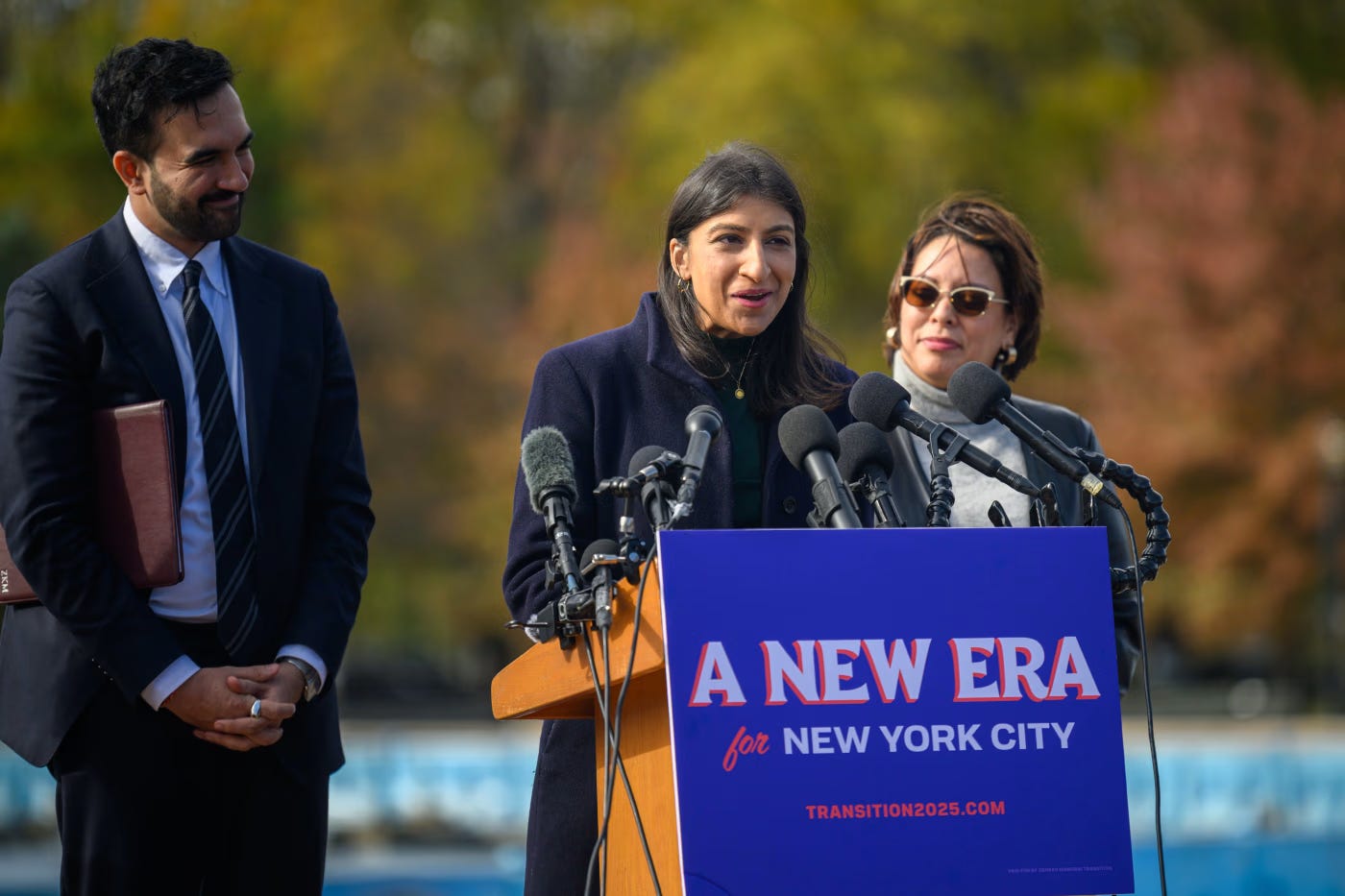Mamdani and the Antimonopoly Movement
In policies and promise, Zohran Mamdani has become antimonopoly's flag bearer
A day after New Yorkers elected Zohran Mamdani the next mayor of New York City by a landslide, Lina Khan stood at a lectern on a bright, crisp New York day and spoke about their shared vision for the city. Mamdani chose Khan, the former superstar Federal Trade Commission chair, to help lead his transition team after centering his campaign on promises to beat back the forces of corporate exploitation that have made the city unaffordable and in many ways unrecognizable to those who live there.
Now, here stood Khan, a visionary critic of corporate abuse and monopoly power, promising to foster a city in which “all workers and small businesses can thrive, and not just get by.”
With Khan by his side, we have arrived at Mamdani’s antimonopoly moment.
This moment has been many months in the making. While Mamdani rarely if ever draped his campaign in the language of antimonopoly, the vision he spoke of on street corners, in the back seats of taxis, and in bodegas far and wide was steeped in antimonopoly — both as a prescription to cure what ails so many New Yorkers, and as a broad and exportable vision for a governance that puts democracy ahead of monopoly. The foundation of his campaign was built, as Khan echoed, on stripping away corporate control of the city and returning power to New York’s workers, tenants and small business owners. This is the essence of antimonopoly both as a set of policies and a philosophy for governance. In six weeks or so, when Mamdani is sworn in as the mayor of New York City, he will do so as the movement’s flag-bearer and as a model for leadership and governance for cities and states nationwide.
I think of the antimonopoly movement as a governing philosophy containing policies that, alone or in tandem, work to deconcentrate industries and break down pockets of outsized corporate power. Antitrust is a big part of this, of course. Antitrust enforcement stops monopoly abuses and prevents the further concentration of the economy. But organized labor fights monopoly as well by largely removing the ability for companies to use their size and power to exploit workers (this is particularly true of sectoral bargaining, in which workers organize and bargain across entire industries, rather than the shop-by-shop organizing that happens today). Tenant organizing transfers power from corporate slumlords to tenants, stripping away their incentive to buy more buildings to find more renters to exploit. Smart land use rules can stop dollar stores, data centers and other predatory businesses from entering and stripmining communities of their wealth and resources — opening the door to small businesses, manufacturing and other, more productive actors that local folks actually want.
The foundation of his campaign was built, as Khan echoed, on stripping away corporate control of the city and returning power to New York’s workers, tenants and small business owners. This is the essence of antimonopoly both as a set of policies and a philosophy for governance.
Throughout his campaign, Mamdani’s policy planks have reflected this vision for a city largely free from the shackles of corporate control. His cornerstone policies — rent freezes, free bus transit, universal childcare, a $30 minimum wage, a ban on non-compete agreements, stronger protections for labor organizing — all return power to working folks and strip away the power corporations use to trap and exploit their employees. His small business platform speaks to the need to support local shops and stores in the face of corporate wealth and regulatory capture. His fight for a more affordable city is, in his own words, a fight against monopolists and those that empower and embolden them. “As Trump loosens consumer protections and empower CEOs, scammers, monopolies, and monopsony power, New York needs a mayor who will stand up to corporate greed and protect working-class dollars.” His plan to create a more affordable city is steeped in antimonopoly principles and policies.
As Mamdani knows, a broad antimonopoly vision of governance must also include some element of collective, public ownership of essential goods and services. His plan for city-owned grocers in New York is one way of addressing the acute problem of food access and affordability in the city. It’s a good solution that has had success elsewhere, but the larger fight against food deserts and high prices also requires strong antitrust law and enforcement to ensure independent grocers and bodegas can compete for shoppers without being bullied and exploited by the PepsiCos and Walmarts of the world.
So long as other antimonopoly forces are at work, public goods, like city-owned health clinics and social housing, offer crucial alternatives in often-monopolized industries. These publicly-owned goods and services exert important pressure on for-profit corporations, disciplining prices and giving the most vulnerable community members clear, affordable ways to meet their needs. Again, publicly-owned goods work best within an antimonopoly ecosystem that supports good jobs and wages, protects communities from exploitation, and deconcentrates industries by making the maintenance of monopoly power legally dangerous and untenable. Mamdani’s vision for New York, and for governance in general, seems to understand the need for this kind of ecosystem — one that puts people first, arrests corporate exploitation, and returns power to communities and the folks who live and work in them.
These coming weeks before Mamdani takes office will be filled with vision and hope for a more equitable New York, with far less corporate abuse and exploitation. But come January, he and his team will begin the very difficult work of reshaping the city in line with this vision of antimonopoly governance. The corporate knives will be out and bad actors in and outside of the Democratic Party abound. But Mamdani’s plan for New York is ultimately antimonopoly’s plan for the broader economy; his success there could mean the movement’s success far beyond the Five Boroughs.



